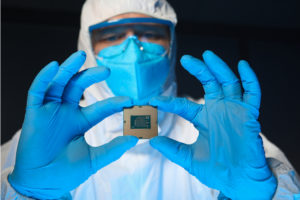
By H_Ko @ Shutterstock.com
As the pace of traditional chip innovation slows down, companies are working on building chips that aren’t just faster, but better for their own applications. Asa Fitch reports in The Wall Street Journal (abridged):
The world’s largest semiconductor companies face a growing competitive threat: their biggest customers making their own chips tailored to the supercharged areas of cloud-computing and artificial intelligence.
Chip making has long been ruled by big manufacturers and design houses such as IntelCorp. INTC -2.32%, Advanced Micro Devices Inc. AMD -2.80% and graphics-chip maker Nvidia Corp. NVDA 0.45% Now Amazon.com Inc., AMZN 0.14% Microsoft Corp. MSFT 1.83%and Google are getting into the game in the hunt for improved performance and lower costs, shifting the balance of power in the industry and pushing traditional chip makers to respond by building more specialized chips for major customers.
Amazon this month unveiled a new chip that, it says, promises to speed up how algorithms that use artificial intelligence learn from data. The company has already designed other processors for its cloud-computing arm, called Amazon Web Services, including the brains of computers known as central processing units.
The pandemic has accelerated the rise of cloud-computing as companies broadly have embraced the kind of digital tools using those remote servers. Amazon, Microsoft, Google and others have enjoyed strong growth in the cloud during the remote-work period.
Driving the tech giants’ moves are changes in how the semiconductor world operates and a growing sense that Moore’s Law—the sector’s fundamental assumption about the steady improvement in chip performance—is losing relevance. As a result, companies are searching for new ways to eke out better performance, not always measured in speed, but sometimes lower power consumption or heat generation.
“Moore’s Law has been around for 55 years, and this is the first time it’s slowed down very materially,” said Partha Ranganathan, a vice president and engineering fellow in Google’s cloud unit, which has been pursuing specialized chips.
By Asa Fitch
If you’re willing to fight for Main Street America, click here to sign up for my free weekly email.




